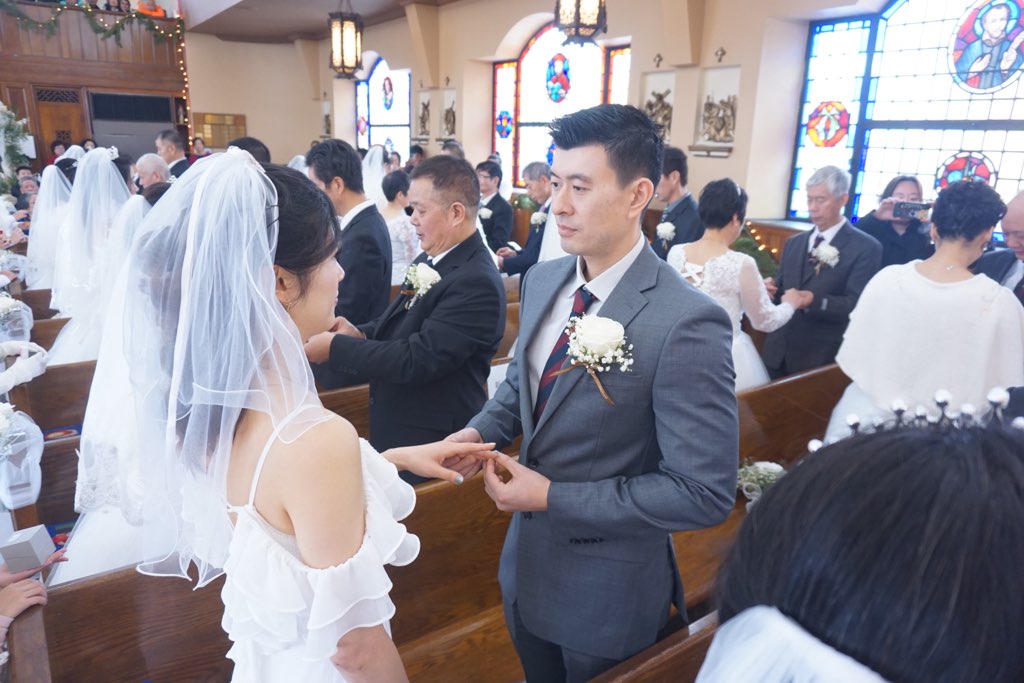Twenty couples gathered Jan. 1 at Holy Redeemer Church in Philadelphia’s Chinatown neighborhood to celebrate a sacrament unavailable to most of them in their native China: the Sacrament of Matrimony.
As the veiled brides in beautiful white gowns and grooms in sharp suits walked up the church’s aisle two by two on this New Year’s morning, their families, friends, and fellow parishioners joined in the festive spirit and celebration of their shared Catholic faith.
“I always wanted a church wedding,” said Mary Wu, who actually married her husband Kevin in a civil ceremony 18 years ago in Shanghai, China.
They met in the United States, became members of Holy Redeemer in 2002, returned to China for business opportunities, then finally came back to Philadelphia to raise their two children and rejoin their beloved parish community.
They and 19 other couples on this day celebrated a marriage convalidation, a blessing rite in which couples renew their marriage vows and commitment in the Church.
All received ornate papal blessings to mark the special occasion.
Father Joseph Jin, a priest of the diocese of Shanghai serving at Holy Redeemer, came up with the idea for a multiple wedding ceremony when he discovered many couples had civilly married long ago or recently in China, but without access to the sacrament because of governmental restrictions.
He then began to invite those couples, who might never have considered the convalidation rite on their own. He also civilly married two young couples for the first time during the Mass.
When the opportunity to join the ceremony at Holy Redeemer arose, the Wus “joked about it” then said, “why not?” Kevin said. “You only live once,” Mary added.

(Matthew Gambino/CatholicPhilly)
For Chinese Catholics in Philadelphia, reception of this sacrament and others is an expression of religious faith and of civic freedom.
After China’s Communist party took control of mainland China in 1949, the state-sanctioned church – Chinese Catholic Patriotic Association – ran in tandem with an “underground” or secretive church whose members faced severe persecution.
When the country’s Cultural Revolution began in 1965, both the official and the underground church disappeared, with only the most private and secretive acts of faith remaining.
“Up until 1980, there simply were no priests; they were all in jail. And there was no Mass for decades,” explained Capuchin Franciscan Father Thomas Betz, pastor of Holy Redeemer Church.
Catholics of that time kept the flame of faith alive by secretly praying the rosary and sharing their few ragged catechisms, he added.
Finally, after 1980 and the efforts of Pope St. John Paul II to bring the faithful of both the official and the underground church into the open, Catholics could again practice their faith.
Yet within the state-sanctioned churches today, according to one Holy Redeemer parishioner, a portrait of the local Communist governor keeps a watchful eye on liturgies. And still the underground church serves the Gospel, quietly.
Therefore, most of the older couples at Holy Redeemer never had the opportunity for a public church wedding.
Even when such sacraments could later be celebrated in the official church as slowly new priests were ordained, strong opposition by family members loyal to the underground church might dissuade young couples from seeking a church marriage. So, they married civilly and then began raising their families.
Father Betz explained that most Catholics at Holy Redeemer Church hail from southern China’s Fujian Province, and almost all identify with China’s underground Catholic community and most arrived in the United States after the year 2000.
As some seek to become naturalized U.S. citizens their claims for legal asylum are “based on religious persecution or family planning,” including forced abortions and sterilizations, “or both,” he said. “Many of these folks suffered from these.”
And the systematic religious persecution in China is worsening, according to the priest who has ministered at Holy Redeemer across more than 30 years.
“In lots of places [in China] (authorities) are preventing families from taking children to church,” said Father Betz. “The Holy See is telling people to come out from the underground (church), just as the government is clamping down on the open church.”
Chinese people coming to Philadelphia since 1941 when Holy Redeemer Church was established have found the church is not only a place of faith but also a focal point – a new home built on rock, in a new land.
“The people in the Chinese community, whether they’re Catholic or not, they really value this church,” Father Betz said. “They understand this church is a major Chinese institution.”
The area’s Chinese residents, “certainly Catholic but not only Catholics, support this church and school,” he said. “We’re not financially struggling because the people support it.”
As an example, Kevin and Mary Wu trek most days from their South Philadelphia home to Chinatown to bring their children to Holy Redeemer School.
And on Sundays, the church is where their extended family and friends reconnect on a weekly basis.
“We get to see siblings and parents when we go to church,” Kevin Wu said.
This includes his wife’s Mary’s parents and an aunt and uncle – all of whom took part in the New Year’s Day wedding celebration.
“We’re very blessed to be part of all this, that we made it happen in front of all these people, to renew our vows and make our marriage stronger,” Kevin said.
Following the Mass, all the wedded couples and their families continued the celebration with a banquet at a Chinatown restaurant.
PREVIOUS: Bishop Fitzgerald Set to Receive Award During Mass of Thanksgiving
NEXT: Archdiocesan Schools in City to Close Tuesday Due to Snow, Will Utilize Flexible Instruction Day



Share this story